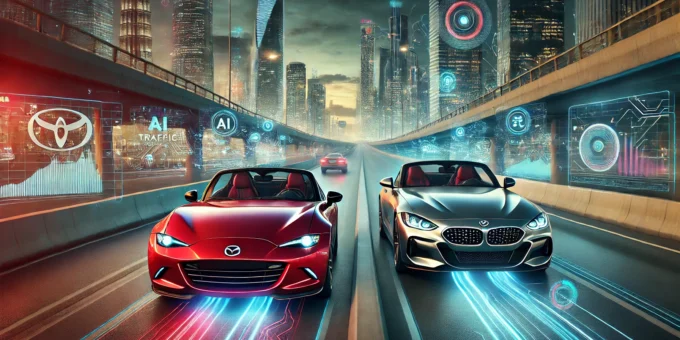
Luxury automobiles have always been synonymous with groundbreaking technology, impeccable craftsmanship, and an unmatched driving experience. In recent years, artificial intelligence (AI) has emerged as a transformative force, driving innovation across the automobile sector. From autonomous driving capabilities to personalized in-car experiences, AI is redefining the concept of luxury in modern vehicles. This article explores the cutting-edge advancements fueled by AI, shaping the future of high-end cars and revolutionizing the automotive industry.
The Rise of Artificial Intelligence in Luxury Automobiles
The integration of AI in luxury automobiles represents the next phase of technological evolution. Luxury car manufacturers, such as Tesla, BMW, and Mercedes-Benz, are leveraging AI to deliver unparalleled features that were once the stuff of science fiction. AI-powered sensors, machine learning algorithms, and real-time data processing have transformed how vehicles are designed, manufactured, and experienced.
These innovations enable luxury brands to create highly responsive systems that anticipate driver needs, ensure safety, and provide an intuitive interface. For example, AI systems can analyze driver behavior to adjust seat positions, climate control, or even recommend playlists based on mood and preferences.
Smart Personalization Features
Modern luxury cars are taking personalization to new heights. AI enables manufacturers to create vehicles that adapt to their owners in unique ways. Using AI, cars can recognize individual drivers through facial recognition or biometric data and automatically adjust settings such as seat position, ambient lighting, and preferred driving modes.
Bentley and Rolls-Royce, for instance, now offer AI-driven bespoke customization that allows customers to design every detail of their vehicle, from upholstery to exterior finishes. AI’s ability to learn from preferences ensures that luxury cars truly reflect the personality and style of their owners.
Autonomous Driving Technology
Autonomous driving technology is one of the most groundbreaking applications of AI in the automotive world. Luxury automakers are at the forefront of this innovation, introducing features like adaptive cruise control, lane-keeping assistance, and fully autonomous driving capabilities.
Tesla’s Autopilot and Mercedes-Benz’s DRIVE PILOT systems are leading examples of how AI enables vehicles to navigate complex traffic environments, avoid obstacles, and make split-second decisions. These technologies not only enhance convenience but also set new safety standards, paving the way for a future where cars drive themselves with precision.
AI in Vehicle Safety Systems
Safety remains a top priority for luxury automakers, and AI has revolutionized the way safety systems operate. AI-powered technologies such as collision detection, emergency braking, and pedestrian recognition have significantly reduced the risk of accidents.
Using advanced computer vision and sensor fusion, cars can detect hazards well before human drivers might notice them. For instance, Volvo’s Pilot Assist technology uses AI to analyze road conditions and prevent accidents by taking preemptive action, making driving safer than ever.
Luxury Through Connectivity
In the age of connectivity, luxury automobiles are becoming mobile command centers. AI enhances in-car infotainment systems, offering features such as voice-activated controls, real-time traffic updates, and seamless smartphone integration. Drivers can interact with their vehicles as they would with a personal assistant, ensuring a seamless and connected experience.
AI-driven systems, such as BMW’s iDrive and Audi’s MMI, provide drivers with intuitive controls that blend entertainment, navigation, and communication, making every journey an enjoyable one.
AI-Powered Predictive Maintenance
Gone are the days of reactive maintenance schedules. AI enables luxury cars to anticipate issues before they arise, saving owners time and money. Predictive maintenance uses AI algorithms to monitor vehicle health in real-time, identifying potential problems such as engine wear or tire pressure issues.
Brands like Porsche and Lexus offer AI-powered diagnostics that send alerts to owners and service centers, ensuring timely intervention. This proactive approach enhances reliability, reduces downtime, and reinforces the premium ownership experience.
Voice Recognition and Virtual Assistants
AI-powered voice recognition systems are redefining how drivers interact with their vehicles. Virtual assistants, such as Amazon Alexa, Google Assistant, and proprietary systems like Mercedes-Benz’s MBUX, provide hands-free control over various functions.
These assistants go beyond basic commands, learning drivers’ speech patterns and preferences to deliver a tailored experience. Whether it’s adjusting the cabin temperature, finding the nearest restaurant, or setting reminders, AI ensures luxury cars are as smart as they are stylish.
AI in Performance Optimization
Performance has always been a hallmark of luxury automobiles, and AI is taking it to the next level. AI systems monitor driving conditions and adjust performance parameters in real-time, ensuring an optimal balance between power and efficiency.
For example, Bugatti’s Chiron uses AI to fine-tune its quad-turbocharged engine, delivering unmatched speed and handling. Similarly, McLaren’s AI-assisted aerodynamics enhance stability at high speeds, showcasing how AI merges performance with cutting-edge technology.
You Can Also Read : How to Balance Luxury Travel with Smart Personal Finance Strategies
The Role of AI in Sustainability
Sustainability is becoming a core focus for luxury automakers, and AI plays a crucial role in achieving eco-friendly goals. AI-driven systems optimize fuel consumption, monitor emissions, and improve battery efficiency in electric vehicles.
For instance, Tesla’s AI algorithms enable its cars to achieve remarkable energy efficiency by managing power distribution and regenerative braking systems. As the industry transitions to greener alternatives, AI ensures luxury remains sustainable without compromising performance.
